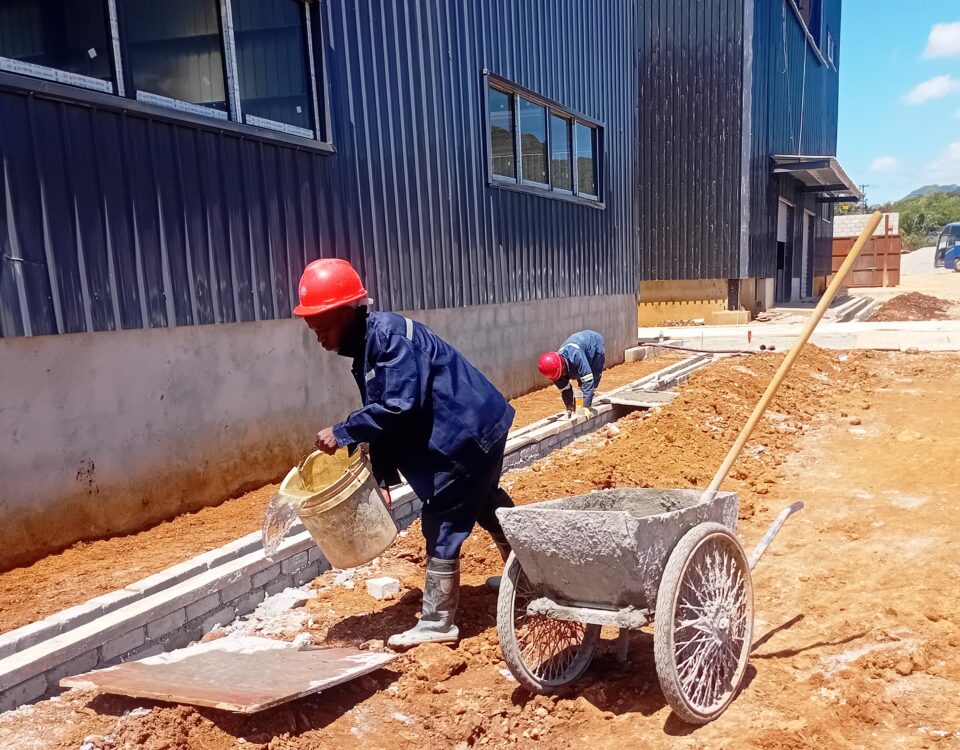
Ambassador of Happiness Chinotimba’s Dubai post goes viral on social media
February 12, 2019
Our Perfect Wedding Zimbabwe on the cards on DStv Zambezi Magic
February 13, 2019$2.4 million per year in salaries lost to utility vehicle imports by Government
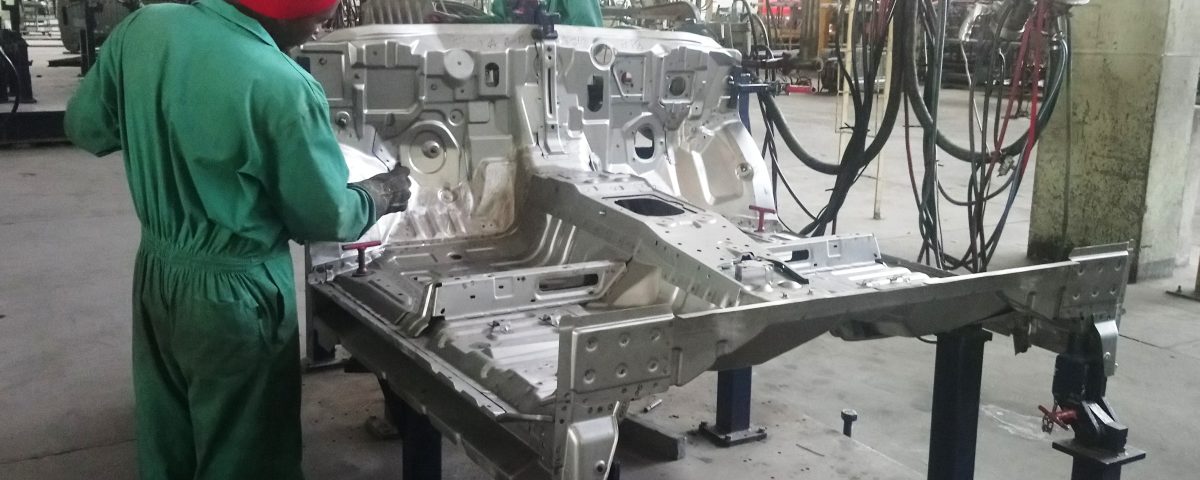
Quest Motors employees at work in the manufacturing plant assembling a Foton Tunland double cab on a jig last week Thursday.
…Government urged to buy all utility vehicles from local assemblers
Ngoni Dapira
IT’s 2pm in the afternoon on a Thursday at Quest Motors Manufacturing plant in Mutare’s Nyakamete Industrial area and literally if you drop a pin on the floor, it can easily be heard, but this is not supposed to be the case in such a modern car assembling plant of its calibre.
Currently operating at less than five percent capacity utilisation with 150 employees working on short working hours, this gloomy picture best depicts the harsh consequences of the callous decision of importing motor vehicles at the expense of local car assemblers which is often made by government and quasi government institutions. This is the fate that has hit Quest Motors, the country’s first assembling plant that has been operational since 1960.
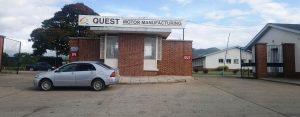
Quest Motors Manufacturing plant in Mutare is no longer a figment of its former glory in the 1990s and if Government does not step in to support local vehicle assemblers it may shutdown.
Early this year in January, the Zimbabwe Electricity Transmission Distribution Company (ZETDC) acquired 29 Nissan pick-up vehicles worth nearly $1 million to improve operational efficiency and general service delivery to its customer’s country wide. At present, government is currently mooting acquiring 500 buses from Belarus through its bilateral agreement deal signed last month, of which this continuous unwarranted import of no-essential goods that are locally manufactured has been the trend for the past 20 year’s, which has led to the collapse of many long-established locally based manufacturing companies.
Zimbabwe currently has two operational car assemblers, Quest Motors and Willowvale Motor Industries (WMI), as well as two bus assemblers Deven Engineering and AVM Africa. Quest Motors has however since 2016 expanded its operations to also assemble buses. All the assemblers are on record to say they have the capacity to produce quality vehicles which match the imports mostly from China and South Africa.
According to the Zimbabwe National Statistics Agency (ZIMSTAT) the country’s market for new vehicles shrunk over the years from the highest level of over 20 000 units per year in 1997 to less than 3500 units in 2016. During the period 2009 to 2014 motor vehicle imports gobbled foreign currency averaging $500 million per year with the main contributor to this however being the upsurge in preference of second hand vehicles.
Sadly, whilst there is a directive issued by the Office of the President and Cabinet that compels all government institutions including parastatals to purchase vehicles from local assemblers, the directive has not been adhered to.
Quest Motors general manager Thomas Sarimana in an interview with the Eastern Times last week Thursday bemoaned lack of political will for the demise being experienced in the country’s vehicle assembling sector. He said given recent developments of government’s intentions to purchase 500 buses to breathe new life into the operations of its moribund Zimbabwe United Passenger Company (ZUPCO), this deal could create a lot of employment and big business for downstream industry in the country’s motor vehicle assembling chain. He added that whilst their buses are made from aluminium and steel and custom made to suit the local road terrain, most imported buses were made from fiberglass and alternately are not as strong to resist the gravel roads and poor road infrastructure in the country which is heavily potholed.
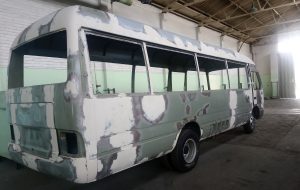
A 26 seater Foton bus near completion at the assembly plant. Quest Motors is now assembling 65 seater Zhongtong buses , 63 seater Yutong buses as well as the new line 56 seater Zhongtong buses.
Sarimana said an order of just 100 buses alone could on average employ over 500 people which could in monetary value approximately be translated as $200 000 in salaries per month and $2.4 million per year. He said sadly all this potential revenue was being exported when 100 buses or utility vehicles are imported by government, which means jobs were also being exported.
“In the vehicle assembling business demand creates need for more manpower. Having an order of 100 buses alone can lead to the employment of 500 people. The lowest operator in the assembly line ears around $300 and this ranges to $500, so you can do the maths on how much money will circulate from 500 extra employees from our current 150. If an order is wanted within less than six months we can actually double the manpower from 500. If it was to run at full capacity, the plant can employ 1 500 to 2000 people as we did in he 1990s,” said Sarimana.
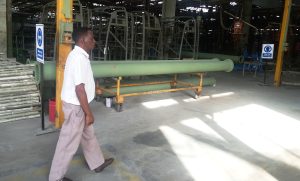
Quest Motors general manager Thomas Sarimana taking journalists through their inactive factory that has seen better days in its heydays.
Sarimana said many countries including neighbours South Africa, ring fenced their automotive industries with significantly higher tariffs and governments provide substantial support to their local assemblers, recognising the benefits of the sector to a country’s economy. He cited how the French government supports the locally assembled Renault franchise.
Cabinet Ministers have in the past received the latest Range Rovers and all eyes are currently on the new dispensation government, which has been talking big on reducing foreign currency expenditure in line with austerity measures being undertaken in its Transitional Stabilisation Programme. Finance and Economic Development Minister Professor Mthuli Ncube has been talking about the economic impasse being a confidence issue, of which Sarimana said confidence could only be triggered by seeing tangibles on the ground, and in some cases positive actions of good faith.
Quest Motors currently deals with four Chinese brands having adopted Government’s thrust of looking East. The four are JMC, Suzuki, Chery, Foton and in the buses line the ZhongTong and Yutong buses. They also produce Proton tractors part of the Volvo family.
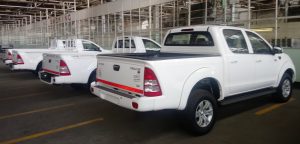
Foton Tunland double cab and single cabs manufactured at Quest Motors ready for the market.
He said it is a reality that not everyone can buy a brand new car, but in the case of government, he said it should take the lead in supporting its local industry to create the jobs in the formal market adding that the downstream effects were massive. “All utility vehicles purchased by line Ministries should be assembled locally. This decree should be adhered to. We talk of the timber industry where we get wood for manufacturing our own gas, glass industry, tyre manufacturing industry, air filter manufacturers and many other companies will benefit if Quest starts operating even at 60 percent,” he said.
The emotional Sarimana said they however remain optimistic given that President Emmerson Mnangagwa had toured their plant before when he was Vice President and was well appraised of their problems.
“What is sad about our case is that since 2016 we embarked on a massive campaign and left no stone unturned on engagement with the powers that be. From all the Vice-Presidents then in 2016, the parliamentary portfolio committee on transport, the then Minister of Industry and Commerce Dr Mike Bimha, the then Minister of Finance Patrick Chinamasa, the Office of the President (OPC), all came to tour our operations…The quality of our vehicles has been tried and tested by CMED, ZRP, ZNA that are still using our Mitsubishi trucks assembled here in the 1990s. So we are now just saying and praying on government to walk the talk on its TSP blueprint and support local industry,” he said.
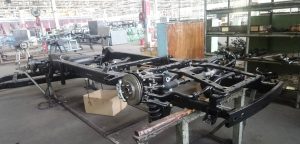
A completely knocked down unit of a Foton Tunland being assembled from scratch on a jig.
Sarimana added that as Quest Motors they are also against the ideas being mooted of promoting semi knocked down (SKD) assembly plants to compete against their completely knocked down (CKD) assembling plants. He said SKD plants would literally promote a ‘supermarket economy ‘ in the motor industry, as it could be done by any professional garage, which means they will employ less people with little downstream effects compared to the thousands employed under their CKD assembly plant models.


